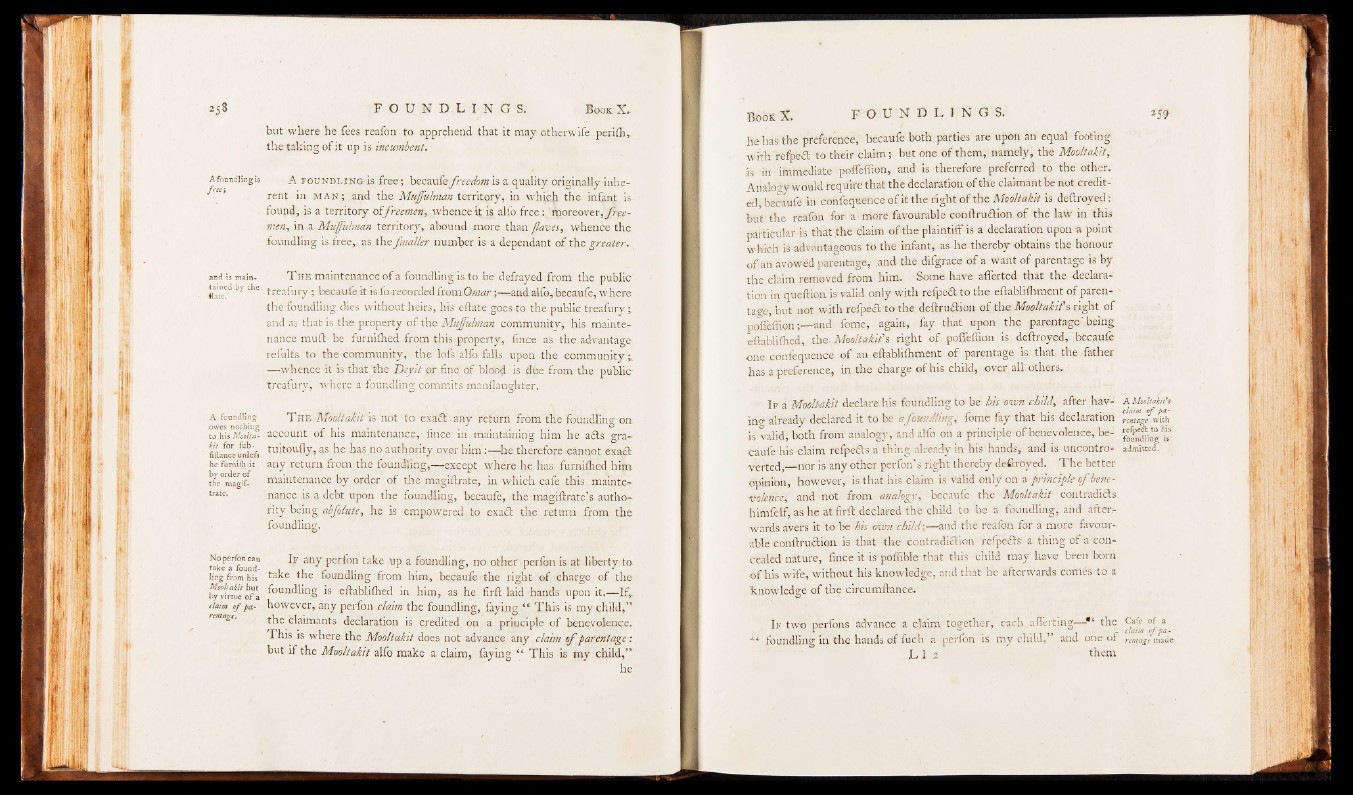
but where he fees reafon to apprehend that it may otherwife perifti,
the taking of it up is incumbent.
A foundling is
free.
and is maintained
by the
ft ate.
A foundling
owes nothing
to his Moolta-
kit for Tub-
fi dance unlefs
he farnilh it
by order of
the magif-
trate.
Noperfoncan
take a foundling
from his
Mooliakit but
by virtue o f a
claim o f parentage.
A f o u n d l i n g is free ; becaufe freedom is a quality originally inherent
in m a n ; and the Mujfulman territory, in wh^clj the infant is.,
foupd, is a territory offreemen, whence it is alfo free : moreover, freemen,
in a Mujfulman territory,, abound more than faves, whence the
foundling is free, as the fmaller number is a dependant of the greater.
T he maintenance of a foundling is to be defrayed from the public
treafury-, becaufe it is -fa recorded from Omar ;— and alfo, becaufe, where
thé foundling, dies without heirs, his eftate goes to the public treafury ;
and as that is the property of the Mujfulman community, his maintenance
mu ft be furnifhed from this property, fince as the advantage
refults to the community, the lofs alfo falls upon the eommunity i
— whence it is that the Deyit or fine of blood is due from the public
treafury, where a foundling commits manflaughter.
T ti'E , M'odltaBt \s not to exadt any return from the foundling on.
account of his maintenance, fince in maintaining him he aâs gratuitously,
as he has no authority over him :— he therefore cannot exact
any return from the foundling,— except where he has furnifhed him
maintenance by order of the magiftrate, in which cafe this maintenance
is a debt upon the -foundling, becaufe, the magiftrate’s authority
being abfolute, he is empowered to exadt the return .from the
foundling.
If any perfon take up a foundling, no other perfon is at liberty to
take the foundling from him, becaufe the right of charge of the.
foundling is eflablifhed in him, as he firft laid hands upon it.— If,,
however, any perfon claim the foundling, faying “ This is my child,”
the claimants declaration is credited on a principle of benevolence.
This is where the Mooltakit does not advance any claim f parentage :
but if the Mooltakit alfo make a claim, faying “ This is my child,” '
he
BobK X. f o u n d l i n g s . a'59
he has the preference, becaufe both parties are upon an equal footing
with refpedt to their claim ; but one of them, namely, thé Mooltakit,
is in immediate poffeffion, and is therefore preferred to the other.
Analogy would require that the declaration of the claimant be not credited
becâufé in Confequence of it the right of the Mooltakit is deftroyed :
but the reafon for a more favourable conftrudlion of the la\v in this
particular is that the claim óf the plaintiff is a declaration upon a point
which is advantageous to the infant, as he thereby obtains the honour
of an avowed parentage, and the difgrace of a want of parentage is by
the claim removed from him. Some have afterted that the declaration
in queftion is valid only with refpeâ to the eftabliftiment of paren- '
tai-e, but not with refpedt'to the deftrudtion of the Mooltakit's right of
poffeffion;— and feme, again, fay that upon the parentage'being
eftablifhed, the- Mooltakit's right of poffeffion is. deftroyed, becaufe
one eonfequence of an eftabliftiment of parentage is that the father
has a preference, in the charge of his child, over all others,
If a Mooltakit declare his foundling to be hi-s own child, after hav-
in°- already declared it to be afoundlings fome fay that his declaration
is valid, both from analogy, and alfo on a principle of benevolence, becaufe
his claim refpects a thing already in his hands, and is uncontroverted,_
nor is any other perfon’s right thereby deftroyed. The better
opinibn, however, is that his claim is valid only on a principle o f benc-
■ volcnce, and not from analogy, becaufe the Mooltakit contradicts
himfelf, as he at firft declared the child to be a foundling, and afterwards
avers it to be his own child-,— and the reafon for à more favourable
conftruftion is that the contradiction refpedts a thing of a concealed
nature, fince it is poffible that this child may have been born
o f his wife, without his knowledge, and that he afterwards cornés to a
knowledge of the circumftance.
If two perfons advance a claim together, each aflerting— the
« foundling in the hands of fuch a perfon is my child,” and one of
L I 2 th em
A M.ooltakit*i
claim o f parentage
with
refpedt to his
foundling is
admitted.
Cafe o f a
claim o f parentage
made